Does CBD Oil Go Bad? Shelf Life Explained
Consumers today are becoming increasingly aware of the products they use and their lifespan. When it comes to wellness essentials such as CBD oil, one might wonder, does CBD oil go bad? It's a legitimate concern for anyone looking to maintain the efficacy of their health supplements. Indeed, like many products with organic components, CBD oil holds an expiration period beyond which its quality may not be assured.
All too often, the excitement of purchasing a new health aid is dampened by the discovery that it has a finite period of usability. CBD oil expiration dates serve as a guideline for consumers to gauge how long they can expect their purchase to hold up, both in terms of potency and safety. A bottle unused for too long might not only become ineffective but could also turn into a sub-optimal product.
In the realm of cannabidiol wellness, the shelf life of CBD oil is typically estimated at 1-2 years. This span hinges on a variety of factors including how you store the product, the nature of the ingredients it's paired with, and the overall quality and purity of the oil itself.
Key Takeaways
- CBD oil does have an expiration date, impacting its effectiveness and safety.
- The shelf life of CBD oil can range from 1-2 years depending on several factors.
- Proper storage and high-quality ingredients are vital for maintaining the shelf life of CBD oil.
- Always pay attention to the expiration date on your CBD oil to ensure you're using a potent product.
- Understanding how to properly store CBD oil can prevent it from going bad prematurely.
Understanding CBD Oil and Its Components
At the core of CBD oil is cannabidiol, a compound extracted from the hemp plant heralded for its potential therapeutic benefits. Typically, this key ingredient is combined with carrier oils, such as olive or coconut oil, to enhance delivery and efficacy. However, the integrity of CBD oil is not perpetual. Over time, factors like cbd oil storage, ingredient quality, and packaging come into play, influencing cbd oil potency degradation and the overall shelf life of the product.
Understanding the intricacies of these elements is vital to ensure the lasting potency and quality of CBD oil. Here are some of the factors that affect cbd oil quality and strategies to mitigate them:
- Carrier Oil Selection: The type of carrier oil can impact both the effectiveness and shelf life of CBD oil. Higher quality carrier oils may offer better stability for the CBD, prolonging its freshness.
- Extraction Techniques: The method by which CBD is extracted from the hemp plant can also affect its quality. Superior extraction methods can ensure a purer concentration of CBD, which can be less prone to degradation.
- Storage Conditions: Proper cbd oil storage — away from heat, light, and air exposure — can significantly extend its shelf life.
An understanding of these components is crucial for both consumers and manufacturers alike. This knowledge empowers consumers to make informed decisions on purchasing and storing CBD oil, while prompting producers to continually refine their processes for better quality and longer-lasting products.
The table below offers a comparison of different storage methods and their expected impact on CBD oil quality:
| Storage Method | Expected Shelf Life | Notes on Potency Degradation |
|---|---|---|
| Ambient room temperature | 1-2 years | Stable potency if kept away from light and heat sources |
| Refrigeration | May extend beyond 2 years | Can diminish the viscosity of oil but maintains potency |
| Exposure to direct sunlight | Less than 1 year | Accelerates potency degradation due to UV light |
| Exposure to high heat | Varies | Significantly reduces shelf life and degrades CBD quality |
It's evident that the right approach to storing CBD oil is critical for preventing potency degradation and ensuring one receives the full therapeutic effect of the oil. By optimizing the way in which CBD oil is kept, consumers can preserve its integrity and providers can ensure their products deliver the intended results.
Does CBD Oil Go Bad?
Amid the surge of interest in natural wellness products, many consumers are asking “how long does CBD oil last?” This is a critical question for anyone investing in cannabidiol for health benefits. The direct answer is yes, CBD oil expiration is a reality. Over time, the active compounds in CBD oil degrade, diminishing its potency and effectiveness. This deterioration means that consumers won't get the same level of benefits from the oil as they would from a fresher product.
Several factors contribute to the question of “does CBD oil expire?” The period for which CBD oil maintains its efficacy typically spans between one to two years. This is contingent upon the conditions under which the product is kept, along with the quality of the oil and its ingredients. While consuming CBD that's marginally past its best before date is unlikely to pose health risks, the user may find that it has lost much of its beneficial impact.
To maximize the shelf life of CBD oil, an understanding of proper storage and product selection is essential. Subsequent sections will delve into best practices for preserving the quality of CBD oil, detecting signs of expiration, and ensuring optimal usage before the product degrades.
- Avoid exposure to extreme temperatures and direct sunlight, as these can accelerate the breakdown of cannabinoids.
- Choose CBD oils with a clear, stamped expiration date to ensure informed usage.
- Understand that while CBD oil expiration will not result in harmful side effects, it will reduce the oil's effectiveness.
While an expired CBD product might not provide its full therapeutic potential, knowing how long does CBD oil last can help consumers derive maximum value from their purchase, and experience the full spectrum of CBD's acclaimed benefits.
The Shelf Life of CBD Oil
When it comes to the well-being of consumers, understanding the shelf life of CBD oil is paramount. This knowledge helps in maintaining the oil's therapeutic qualities and ensuring it is used within an effective period. As we explore the intricacies of how long does CBD oil last, it becomes clear that several variables come into play, each affecting the oil's lifespan and efficacy.
Typical Duration of CBD Potency
The duration for which CBD oil retains its effectiveness is a matter of keen interest for users who seek to gain the maximum health benefits. Generally, the potency of CBD oil is maintained for approximately 1-2 years from the date of production, contingent upon a variety of conditions relating to its formulation and cbd oil storage.
Influence of Storage and Quality on Longevity
Although one may ask how long does cbd oil last, the answer largely depends on the specific details of storage and quality. Both of these factors play an influential role in the longevity of CBD oil, affecting how the product withstands the test of time.
- Storing CBD oil in cool, dark places away from direct sunlight helps in preventing premature degradation of cannabinoids.
- The overall quality of CBD oil, encompassing the pureness of ingredients and the extraction process utilized, directly correlates to its shelf life.
- Quality packaging, preferably dark and airtight containers, can significantly extend the viable lifespan of the product by protecting it from air and light exposure.
For a clearer perspective, here is a table that breaks down the shelf life of CBD oil based on various storage practices:
| Storage Condition | Impact on Shelf Life | Best Practices |
|---|---|---|
| Room temperature, away from light | Optimal condition, maintains potency for 1-2 years | Avoid windows or areas where sunlight is prevalent |
| Cool, dark cupboard or closet | Preserves oil quality, extends possible shelf life | Ensure the area is dry and free from temperature fluctuations |
| Refrigerator | Can extend shelf life, but may alter oil viscosity | Let oil reach room temperature before use to ensure proper consistency |
| Exposure to heat or sunlight | Significantly reduces shelf life, risks potency loss | Generally advised against for long-term storage of CBD oil |
Ultimately, those seeking to enjoy the myriad of potential benefits offered by CBD oil should heed the guidelines for proper storage and remain alert to the oil's expiration date. This consideration not only extends the window of time in which the CBD oil is most potent but also allows for the safest and most effective use of the product.
Indicators of CBD Oil Potency Degradation
For those utilizing CBD oil for its therapeutic properties, recognizing when the product is no longer at its peak potency is crucial. As with any natural product, CBD oil is vulnerable to factors that can degrade its quality over time. Understanding how to tell if CBD oil is bad is important not just for ensuring you get the intended benefits, but also for avoiding the disappointment of using an inferior product. CBD oil potency degradation can be indicated by a few observable changes, including variations in color, consistency, and odor.
Evaluating the Color and Consistency Changes
One clear sign of depreciating CBD oil is an alteration in its physical appearance. Fresh CBD oil should have a consistent, fluid texture and a clear-to-light golden color. If you notice that the oil has become murky, has developed sediments, or the color has darkened significantly, it could be an indicator that the oil is past its prime. These changes often suggest exposure to too much light, heat, or air, all of which can accelerate the rate at which does CBD oil go bad.
Assessing Odor to Determine Freshness
Aroma is another useful gauge when ascertaining the condition of CBD oil. Typically, CBD oil possesses a natural, mildly earthy scent that should not be overwhelming or unpleasant. If the scent changes to something sour or offensive, it's a strong indication that the oil may have become rancid. Paying attention to these signs can save one from the unfortunate experience of using a product that has lost its desired efficacy due to cbd oil potency degradation.
- If the scent of CBD oil becomes sharply unpleasant, consider it a sign that the oil may have expired.
- A change in consistency, such as thickening or cloudiness, can also indicate that CBD oil has started to degrade.
Arming oneself with this knowledge enables a more informed and cautious use of CBD oil, ensuring that one obtains the best results from their products before any potency degradation can diminish the expected benefits.
Factors That Affect CBD Oil Quality
When it comes to the efficacy and longevity of CBD oil, various determinant factors that affect CBD oil quality come to the fore. From cbd oil storage conditions to the integrity of the ingredients used, each element plays a pivotal role in the eventual effectiveness of the oil and its longevity.
Ensuring that your CBD product has been siphoned through rigorous third-party testing is one such factor. This testing serves as a stamp of quality and confirms that the product you are purchasing has what it claims to contain—no more, no less. Above all, these tests can also ensure that the product is free of contaminants, making it a safer choice. Let's delve deeper into the core influences on CBD oil's quality.
Ingredient Quality and Shelf Life: First, the longevity of the carrier oils and any additional flavorings can affect the product's shelf life. For example, oils with a shorter shelf life, such as certain nut-based oils, may lead to faster cbd oil potency degradation over time.
Credibility of the Brand: The reputation and transparency of the CBD oil manufacturer play a crucial role in ensuring quality. Credible brands sustain higher standards in sourcing their hemp and during the manufacturing process.
Extraction Methods Employed: A topline factor is the method of CBD extraction. Superior methods such as CO2 extraction can maintain the cannabinoids' stability, thus enhancing the oil's shelf life and overall potency.
Storage Conditions: Whether kept in a home medicine cabinet or on a retail shelf, cbd oil storage is critical. CBD oil should be stored away from direct sunlight in a cool, dark place to prevent premature potency loss.
| Factor | Impact on CBD Oil Quality | Notes for Consumers |
|---|---|---|
| Carrier Oil Type | Can increase/decrease shelf life | Look for stable carrier oils like coconut or MCT oil |
| Brand Transparency | Reflects on the product's authenticity | Seek brands with comprehensive third-party testing |
| Extraction Method | Influences purity and longevity | Prefer oils extracted using the CO2 method |
| Storage Conditions | Essential for preserving potency | Avoid heat and light; store in cool, dark environments |
In sum, an informed consumer should be vigilant in considering each of these factors before purchase, and continue to be conscientious about cbd oil storage post-purchase to ensure the maximum efficacy and shelf life of their CBD oil.
Tips for Proper CBD Oil Storage
Ensuring the longevity and effectiveness of CBD oil involves more than just avoiding its exposure to the elements; it requires careful consideration of storage conditions. The right cbd oil storage methods play a crucial role in preserving the oil's therapeutic properties and extending the shelf life of cbd oil. It is important to recognize how environmental factors can degrade CBD potency. Below are strategies to mitigate such risks and maintain the quality of your CBD oil investment.
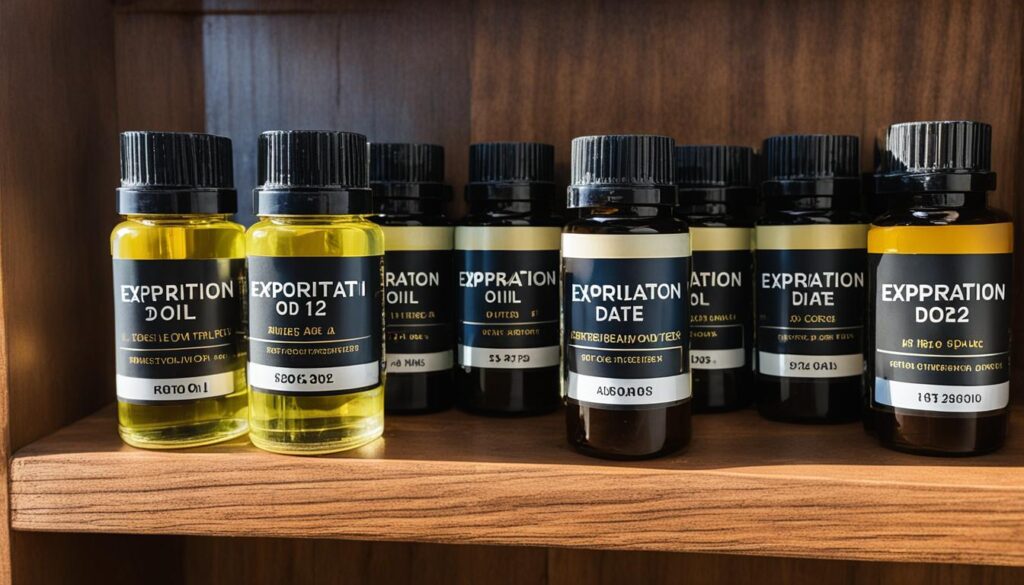
Why Light, Temperature, and Air Matter
Light, temperature, and air are the trifecta of elements that can greatly impact the integrity of your CBD oil. Direct sunlight and excessive heat can hasten the breakdown of cannabinoids and terpenes, leading to cbd oil potency degradation. Similarly, exposure to air, especially oxygen, can promote the oxidation process, essentially compromising the oil's purity and causing it to go bad more rapidly.
Best Practices for Extending CBD Oil’s Shelf Life
Adaptation of these best practices for cbd oil storage is imperative to safeguarding the oil against premature expiration. Understanding how to tell if cbd oil is bad might not suffice; proactive measures are a more reliable approach. To prolong your CBD oil's usability and sustain its therapeutic potential, consider the following storage tips:
- Store your oil in a cool, dark place far from any direct heat sources or sunlight, such as a cupboard, drawer, or closet.
- Make use of dark-colored, airtight bottles that can prevent light penetration and minimize air exposure.
- Keep the temperature consistent and moderate where you store the CBD oil — extreme temperatures can degrade its quality faster.
Here's a table that draws a comparison between various storage practices and their effect on the shelf life of CBD oil:
| Storage Method | Effectiveness for Extending Shelf Life | Recommendations |
|---|---|---|
| Dark, Cool Place | Highly Effective | Best long-term option to prevent degradation |
| Opaque, Airtight Containers | Highly Effective | Preserves potency by blocking light and air |
| Refrigeration | Generally Effective | Can be used but not necessary; allow to warm before use |
| Room Temperature | Effective | Avoid areas prone to temperature change |
| Near Windows or Heat Sources | Ineffective | Should be avoided to preserve the oil's quality |
Conscientious adherence to these storage guidelines will not only extend the shelf life of cbd oil, but also assure that its quality remains intact until the last drop. By recognizing the significance of proper cbd oil storage methods, you are taking an essential step in maximizing the efficacy and lifespan of this wellness product.
How Long Does CBD Oil Last?
Delving into the heart of the matter, consumers frequently question “how long does CBD oil last?” It's a valid contemplation as CBD oil, like all perishable products, has a definite lifespan, beyond which its therapeutic qualities may not be guaranteed. Typically, the shelf life of CBD oil ranges between 1 to 2 years following its manufacturing date. This timeframe assumes that the oil is stored properly and crafted with high-quality ingredients—a testament to the product's enduring stability.
An important point of consideration is whether does CBD oil expire? Indeed, it does. The longevity of CBD oil is intricately linked to the types of carrier oils used in its formulation and the extraction methods employed to harvest the CBD. For instance, methods like CO2 extraction yield a purer, more chemically stable product, which in turn tends to have a longer shelf life.
To illuminate the point further, let's explore the influence of different factors on the shelf life of CBD oil:
| Factor | Impact on Shelf Life | Recommended Action for Longevity |
|---|---|---|
| Quality of Ingredients | High-quality ingredients may improve shelf life | Opt for oils with quality carrier oils and high purity CBD |
| Extraction Method | Certain methods preserve CBD's potency longer | Prefer oils extracted using CO2 or other non-toxic solvents |
| Storage Conditions | Direct light, air, and heat can drastically reduce shelf life | Store in a cool, dark place in airtight containers |
| Type of Carrier Oil | Carrier oils have varying expiry dates that can affect CBD oil | Check the shelf life of the carrier oil used in your CBD product |
Given these factors, it is clear that the how long does CBD oil last query is not just about a static number; it's about the interplay of quality, preservation, and care. By understanding these nuances, consumers can make informed decisions about their CBD oil purchases and storage, ensuring they enjoy the product during its optimal efficacy window.
In summary, when considering the purchase and use of CBD oil, the date of manufacture should be taken into account along with how the product was made and how it's been maintained. Striving to protect your CBD oil from expiring prematurely lies largely in the hands which care for it post-purchase, warranting meticulousness in storage habits. It is in these efforts that one can extend the shelf life of CBD oil to its fullest potential.
Does CBD Oil Expire?
Deciphering the lifespan of CBD oil is critical for those integrating this supplement into their health regimen. Understanding the parameters of cbd oil expiration is tantamount to ensuring you're benefiting from its maximum potential. It's not just about checking off days on a calendar—it's about delving deeper into the product's molecular integrity and its interaction with the environment and packaging material.
What the Expiration Date Really Means for CBD Oil
Indeed, a paramount question on the minds of many is “does cbd oil expire?” The simple answer is, yes. Every bottle of CBD oil comes with an expiration date, an important marker which signifies the period within which the oil is best used to experience the full extent of its benefits. This date is not merely suggestive; it is reflective of when the intrinsic properties of the cannabinoids may begin to diminish in potency, a prime concern for those utilizing CBD for therapeutic purposes.
Understanding the Role of Carrier Oils in CBD Oil Expiry
The role of carrier oils is indispensable in the realm of CBD oil—it's the medium that transports CBD into your body. However, the stability of these oils, such as MCT (medium-chain triglyceride) oil or coconut oil, hold their own timelines of degradation and can significantly dictate cbd oil expiration. The synergy between the CBD extract and the carrier oil requires harmony for longevity, and disruption in this balance could accelerate the overall expiry of the product. Users should be vigilant, not just regarding how to tell if cbd oil is bad, but also about the inherent shelf life of the carriers in the mix.
| Carrier Oil Type | Impact on CBD Oil Shelf Life |
|---|---|
| MCT Oil | Provides a stable shelf life, typically aligning with the CBD's own lifespan |
| Coconut Oil | Has a considerable shelf life but may turn rancid if stored improperly |
| Hemp Seed Oil | Prone to quicker oxidation, can compromise CBD oil's freshness sooner |
Consumers should closely heed the expiration date imprinted on their CBD oil packaging to ensure they are operating within the timeframe that guarantees a potent and safe product. It is this cognizance that helps maintain the high standards one would expect from a premium wellness commodity like CBD oil.
Signs That Your CBD Oil May Have Expired
Monitoring the shelf life of your CBD oil is key to ensuring that you are receiving its full beneficial effects. Does CBD oil go bad? Indeed, like other wellness products, CBD oil comes with an expiration date, and being able to recognize signs your CBD oil has expired is crucial for any CBD user. Let's explore some key indicators that could suggest your CBD oil may no longer be at its optimal potency.
Detecting Changes in Texture and Smell
Essential to how to tell if CBD oil is bad is noting any changes in the product's texture and smell. Fresh CBD oil should be smooth and fluid, but an indicator that it may have expired is if the texture becomes noticeably thicker or if separation occurs. Additionally, a fresh CBD fragrance that turns foul or significantly alters indicates that the CBD oil's best days are likely behind it.
Recognizing Variations in Color and Taste
Fresh CBD oil should have a clear to slightly golden color. If you notice that your oil has become darker or more opaque, this could be one of the signs your CBD oil has expired. Furthermore, taste is an important clue—CBD oil that tastes markedly different or unpleasant compared to when it was fresh could indicate that the oil has gone bad. While refrigeration can cause temporary changes in the consistency of CBD oil, if these characteristics persist at room temperature, it's best to consider that the oil may have passed its prime.
Maximizing the Benefits of CBD Oil Before It Goes Bad
For consumers looking to ensure they are maximizing CBD benefits, it's crucial to understand the intricacies of does CBD oil go bad and the factors leading to cbd oil potency degradation. Just as the quality of food diminishes post its expiration date, CBD oil too has a shelf life after which it loses its efficacy. Knowing how to effectively use and store CBD oil can drastically extend its potency and allow consumers to reap its benefits for as long as possible.
Regular usage within the prescribed dosage is paramount. Not only does this practice help maintain consistent therapeutic levels of CBD in the system, but it also mitigates the risk of the oil lingering beyond its optimal period.
Storage, too, influences the longevity of CBD oil. Protecting the product from light, heat, and air can stave off the processes that lead to spoilage. This can be aided by keeping the oil in its original, manufacturer-provided packaging which is often designed to protect from these very elements.
Beyond storage, being vigilant about the “best by” date is advised. Below, a detailed table outlines the relationship between storage practices and their effectiveness in prolonging the shelf life of CBD oil:
| Storage Practice | Effectiveness |
|---|---|
| Dark, cool, dry place | High effectiveness in slowing down degradation |
| Original dark-tinted bottles | Essential for preventing light-induced spoilage |
| Away from direct heat sources | Prevents heat-induced breakdown of compounds |
| Airtight when not in use | Minimizes oxidation and maintains potency |
| Observe the expiration date | Ensures usage within the period of peak efficacy |
To conclude, adhering to recommended dosages and best storage practices is key to maximizing CBD benefits. By taking these measures, users will not only prolong the powerful effects of CBD oil but will also avoid the inconveniences associated with its expiration. Staying informed and mindful about the care of CBD oil ensures that one experiences the highest caliber of its potential, safely and effectively.
Purchasing and Caring for High-Quality CBD Oil
With an expanding market of CBD products, discerning the quality of CBD oil is paramount for consumers looking to integrate this supplement into their wellness routine. Multiple factors that affect CBD oil quality can determine the efficacy and longevity of the product, making the selection process critical for those intent on choosing a reliable CBD oil. Understanding these factors, coupled with keen cbd oil storage practices, ensures that the oil retains its potency and therapeutic benefits.
Choosing a Reliable Vendor and Brand
Finding a trusted vendor is the first step in acquiring a CBD oil of assured quality. A brand's reputation for providing high-grade, thoroughly tested products instills confidence in purchasing decisions. It's essential to verify that the brand not only adheres to good manufacturing practices but also guarantees transparency through accessible and comprehensive third-party lab results.
Criteria for Assessing CBD Oil Quality
Consumers can evaluate CBD oil using a criterion that reflects the product's overall integrity. Look for clear indications of the oil's origin, such as the provenance of the hemp and specific details regarding the extraction methods employed. Further, verify that the CBD oil comes with precise labeling that includes an expiration date, a clear sign of a brand's commitment to quality.
Beyond these preliminary evaluations, there are other significant tips for maintaining the quality of purchased CBD oil:
- After opening, seal the container tightly to prevent excess exposure to air.
- Use clean utensils when handling CBD oil to avoid contamination.
- Record the date of purchase and opening, and plan to use the oil within its recommended shelf life.
By implementing these practices, you contribute effectively to cbd oil storage, safeguarding the oil against early spoilage and potency loss. Diligent care of CBD oil not only preserves its therapeutic properties but also provides peace of mind regarding product safety and value.
Preserving the Shelf Life of CBD Oil Through Proper Management
Effective proper CBD oil management is key to maximizing CBD benefits and safeguarding the shelf life of CBD oil. This involves a combination of strategies, from the selection of packaging to the environment in which it is stored. The steps you take today can have a significant impact on the performance of your CBD oil over time. Below is guidance on how to get the most out of your product's lifespan.
To maintain the efficacy of CBD oil, one should pay attention to a few imperative practices:
- Always store the oil in its original container to limit exposure to air and light.
- Ensure that any utensils used with the oil, such as droppers or spoons, are clean to prevent contamination.
- Keep the container sealed tightly when not in use to prevent oxidation.
- Find a storage space that remains cool and dark, like a cupboard or closet, to further protect against degeneration.
Following these benchmarks will help to confirm that you are doing everything possible to preserve your CBD oil. Now, let's consider in detail the most effective storage methods and the scientific reasoning behind them.
| Storage Method | Reasoning | Impact on Shelf Life |
|---|---|---|
| Original dark-tinted bottles | Blocks UV rays which can degrade cannabinoids | Key in preventing premature breakdown; aligns with maximum shelf life |
| Cool, temperature-stable environments | Avoids fluctuations that can cause molecular instability | Maintains viscosity and prevents separation of components |
| Minimize air exposure | Oxidation can lead to the breakdown of active compounds | Preserves potency and prevents the oil from becoming rancid |
| Avoid direct heat | Excessive heat can alter the chemical composition | Provides an environment conducive to longevity |
The above table reflects the elements critical to maximizing CBD benefits by preserving the oil's quality. Remember, managing these conditions doesn't require elaborate setups or costly investments. Often, a simple, thoughtful approach to where and how you store your CBD oil can suffice.
To give a visual perspective on the importance of these management practices, let's consider the image below:
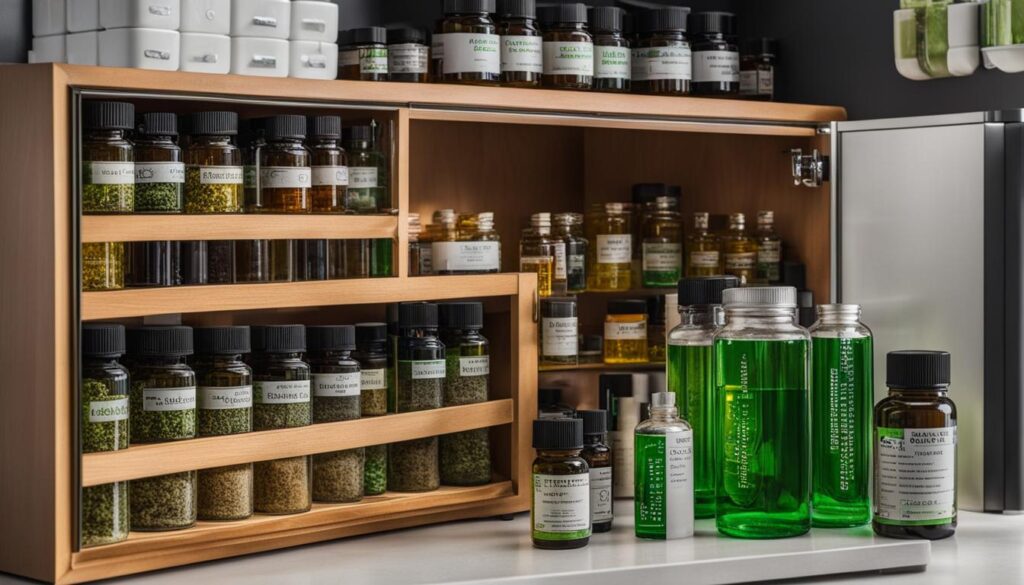
In addition to these practices, be mindful of the “best by” date provided by the manufacturer. This date is a conservative estimate of when the oil is expected to retain its finest quality and strength. By adopting these guidelines, you're not only ensuring that you're reaping the complete benefits of the oil but also guaranteeing that it remains a safe component of your wellness regimen.
Ultimately, proper CBD oil management should be seen as an ongoing commitment, rather than a one-time effort. It is about creating habits that will ensure the shelf life of CBD oil is as long as possible, hence maximizing CBD benefits for your well-being.
What to Do with Expired CBD Oil
As the awareness around the shelf life of CBD oil grows, so does the conversation regarding the safe disposal of cbd oil. Once a product has surpassed its expiration date, it may lose its potency and, as a result, its effectiveness. While it generally remains non-harmful, expired CBD oil should be disposed of conscientiously to prevent misuse and adhere to environmental responsibility.
Safe Disposal of Potency-Degraded CBD Products
Disposing of CBD oil that has lost its efficacy involves more than tossing it in the trash. There are eco-friendly options that can prevent potential contamination of the soil and waterways. For instance, many communities host pharmaceutical take-back programs where expired or unused wellness products can be dropped off for safe disposal. These programs ensure that the CBD oil is disposed of in a manner that is considerate of the environment and follows local disposal regulations.
Alternatives to Using CBD Oil Past Its Prime
When faced with expired cbd oil usage, consumers might wonder if there are any alternative uses for their product. While repurposing is generally not recommended for ingestion, there may be ways to salvage the remaining oil, such as using it as a topical for its moisturizing properties, albeit without expecting the therapeutic benefits it once promised. However, always err on the side of caution, and if in doubt, opt for responsible disposal and replace it with a fresh, potent bottle.
Below is a table reflecting various suggested methods for the disposal or repurposing of expired CBD oil:
| Method | Description | Eco-friendliness |
|---|---|---|
| Take-back Programs | Community-hosted events specifically for pharmaceutical disposal | High |
| Household Hazardous Waste Facilities | Facilities equipped to handle substances that are considered hazardous to the environment | High |
| Unused Medication Disposal Bins | Local pharmacies or clinics may offer bins for safe medication disposal | High |
| Topical Application | Using expired CBD oil externally, with caution and no expectation of its full CBD benefits | Low Impact (limited reuse) |
Remember, when dealing with expired CBD oil, the priority is ensuring cbd oil disposal alternatives that are in line with environmental safety standards and preventing misuse. It's crucial to check with local waste management policies for the best course of action when disposing of any CBD product that has lost its potency.
Conclusion
Throughout this exploration of CBD oil's shelf life, it has become clear that understanding CBD oil expiration is more than a precaution—it's a cornerstone to ensuring both the effectiveness and safety of the product we rely on for various health benefits. The factors determining the shelf life of CBD oil are numerous, but none are more influential than the quality of ingredients used, the storage conditions maintained, and the credibility of the brand from which the oil is purchased.
For users aiming for CBD oil quality maintenance, it is imperative to follow the guidelines set for storage—keeping the oil in a cool, dark place, away from direct sunlight, and in an airtight container. Awareness of expiration dates cannot be overstated; a vigilance that extends the viability of the product but also underscores the importance of consuming CBD oil while it's at its optimal potency.
Embarking on the CBD journey with knowledge as our guide ensures that we derive the most out of our investment in wellness. The keen attention paid to these details guarantees that our CBD oil remains a valuable ally in our health and wellness routines, an integrity preserved against the inevitable ticking clock of time.
FAQ
Does CBD Oil Go Bad?
Yes, CBD oil can go bad. The shelf life of CBD oil typically ranges between 1 to 2 years depending on storage conditions, the quality of ingredients, and the production methods used. Like any consumable product, its potency can degrade over time.
What Factors Affect the Quality of CBD Oil?
Several factors that affect the quality of CBD oil include the extraction methods, the quality and type of carrier oil used, exposure to light, heat, and air, and the presence of preservatives or other additives. Proper storage and high-quality ingredients can help maintain the efficacy of CBD oil.
How Long Does CBD Oil Last?
CBD oil typically lasts for about 1 to 2 years from the date of production when stored properly and made with high-quality ingredients. The longevity of CBD oil can be influenced by the storage conditions and quality of the product.
How Can You Tell if CBD Oil Is Bad?
Signs that CBD oil might have gone bad include changes in its color, consistency, and odor. If the oil develops a rancid smell, changes to a darker color, or becomes thicker or murky in appearance, it may have expired or degraded in quality.
What Does the Expiration Date on CBD Oil Mean?
The expiration date on CBD oil indicates the time frame within which the manufacturer guarantees the product's maximum potency and safety. Using CBD oil past its expiration date may result in a less effective product and is not recommended.
How Should You Store CBD Oil?
CBD oil should be stored in a cool, dark place away from direct sunlight and extreme temperatures. Using airtight and opaque containers will help protect it from light and air, which can speed up the degradation process. Proper storage conditions can help extend the shelf life of CBD oil.
What Is the Role of Carrier Oils in CBD Oil Expiry?
Carrier oils, such as MCT, coconut, or hemp seed oils, are used as a base for CBD oil and have their own shelf life which can influence the overall expiration date of the CBD product. The type of carrier oil and its quality play a crucial role in the longevity of the CBD oil.
Can You Still Use CBD Oil After It Has Expired?
Using CBD oil after it has expired is not recommended as the potency and effectiveness might have significantly decreased. While it's not likely to cause harm, the therapeutic benefits may be diminished, and you will not get the optimal benefits the product once offered.
How Do You Choose a High-Quality CBD Oil?
To choose a high-quality CBD oil, look for a credible brand with a good reputation, clear labeling that includes an expiration date, and verified third-party testing results. Additionally, check for the oil's source, production methods, and active ingredient concentration.
What Should You Do with Expired CBD Oil?
Expired CBD oil should be disposed of safely and responsibly. Avoid ingesting expired CBD oil, as its therapeutic benefits are likely to be less effective. Check local regulations for the recommended way of disposing of such products.
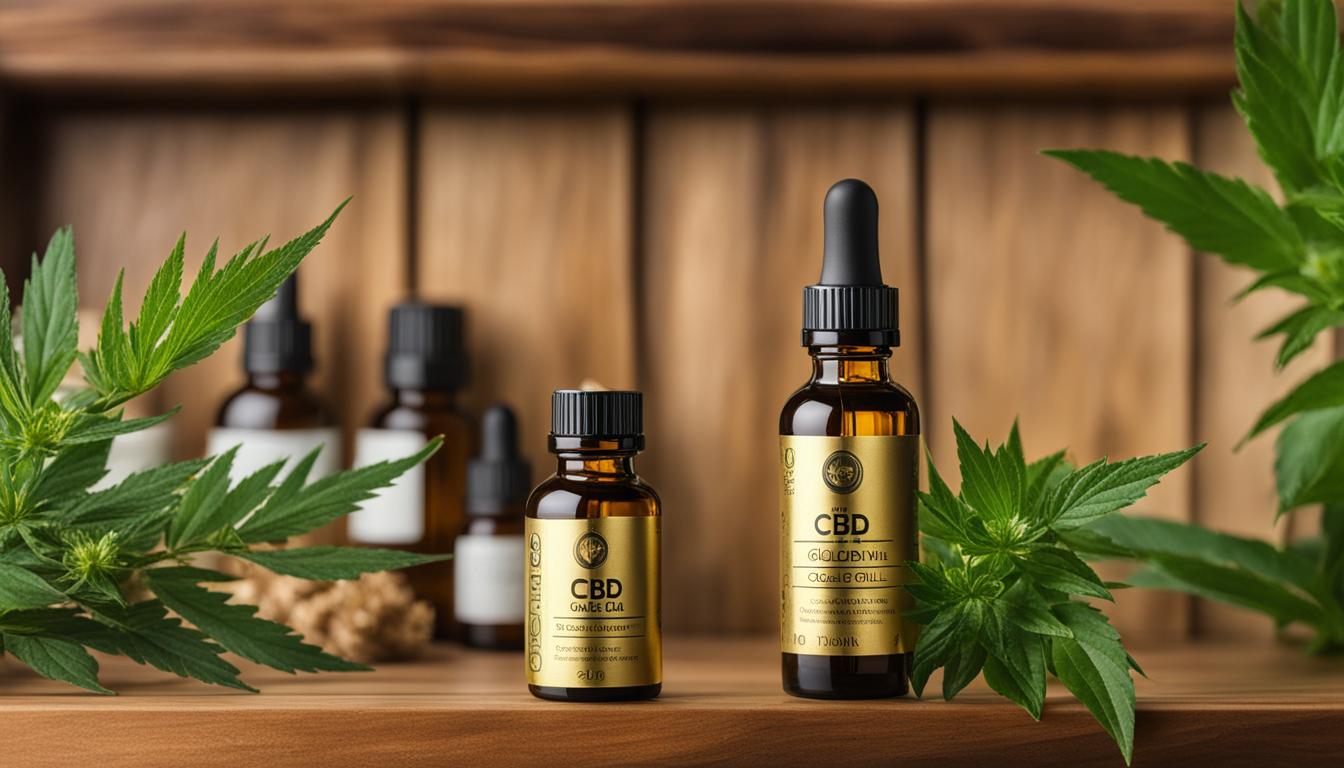



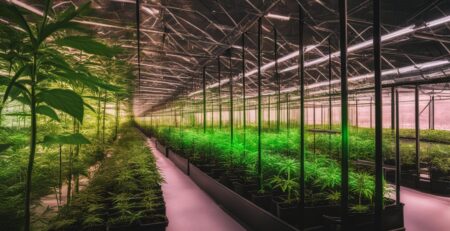



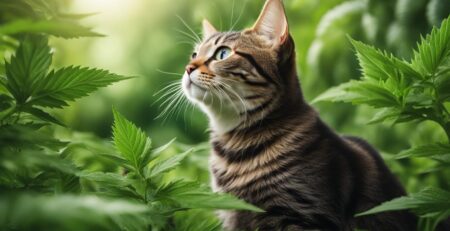


Leave a Reply